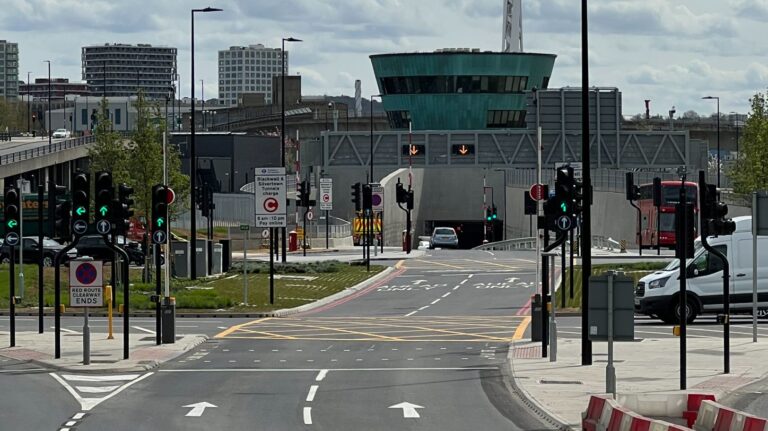Transport for London (TfL) has confirmed that the recently opened Silvertown Tunnel is beginning to ease congestion on east London’s river crossings, with early data showing a reduction in traffic volumes at the adjacent Blackwall Tunnel.
According to TfL, approximately 88,000 vehicles are now using the Silvertown and Blackwall tunnels combined each weekday, with around 20,000 vehicles using Silvertown alone.
Prior to the new tunnel’s opening on 7 April 2025, the Blackwall Tunnel carried close to 100,000 vehicles daily, meaning weekday traffic volumes have fallen by 12%.
London’s deputy mayor for transport, Seb Dance, described the initial figures as “encouraging” and highlighted the benefit of more reliable journey times for motorists and freight operators.
TfL also noted that the Silvertown Tunnel has acted as an important diversion route during closures of the Blackwall Tunnel, including a recent incident on 14 May.
In addition to improving resilience for road users, the Silvertown Tunnel has reportedly enhanced cross-river public transport services.
TfL reports that the three bus routes using the tunnel – the new Superloop SL4, an extended route 129 and the existing route 108 – have carried more than 20,000 passengers daily, with around 7,000 river crossings made by bus each day.
Prior to the opening of Silvertown, only route 108 served the Blackwall Tunnel, carrying approximately 2,700 passengers daily.
All buses operating through the tunnel are zero-emission vehicles, aligning with the Mayor of London’s environmental goals.
A free shuttle bus for cyclists has also been introduced and is currently being used by 100–150 cyclists daily.
A tolling regime is in operation for both Silvertown and Blackwall tunnels, with charges of up to £4 during peak hours.
FREE: Subscribe to the monthly Road User Charging Conference Newsletter!
TfL has stated that the toll is designed to prevent an increase in car journeys and ensure that traffic levels remain manageable.
Early compliance figures show around 90% of drivers are either paying the charge or are eligible for exemptions.
However, TfL has observed an increase in vehicle volumes at the Woolwich Ferry, with an estimated 1,800 additional vehicles using the service each day since tolls were introduced.
The transport authority is monitoring the ferry closely to ensure it can cope with the increased demand.
The £2.2bn twin-bore Silvertown Tunnel is the first new road crossing of the Thames in east London in more than 30 years.
Delivered through a public-private partnership with Riverlinx, the project was completed on time and within budget.
Despite the positive impact on congestion, the tunnel has faced opposition from environmental groups and local campaigners, who argue that the project reinforces car dependency and increases heavy goods vehicle traffic.
There has also been criticism regarding the lack of pedestrian and cycling access, with some campaigners staging protests earlier this year.
TfL has committed to providing quarterly updates on tunnel usage, toll compliance rates and the performance of public transport and cycling services linked to the tunnel.
Discover the key trends and challenges shaping the future of user-financed transportation –spanning tolling, road pricing and usage-charges – at Akabo Media’s global Road User Charging Conference series. Join senior decision-makers from around the world as they tackle the issues defining the industry in Miami (September 2025), Singapore (October 2025), Brussels (March 2026), and Abu Dhabi (May 2026). Gain invaluable insights, share innovative ideas and network with global leaders driving the transformation of transportation systems. Click here to learn more and secure your place at these unmissable events!





